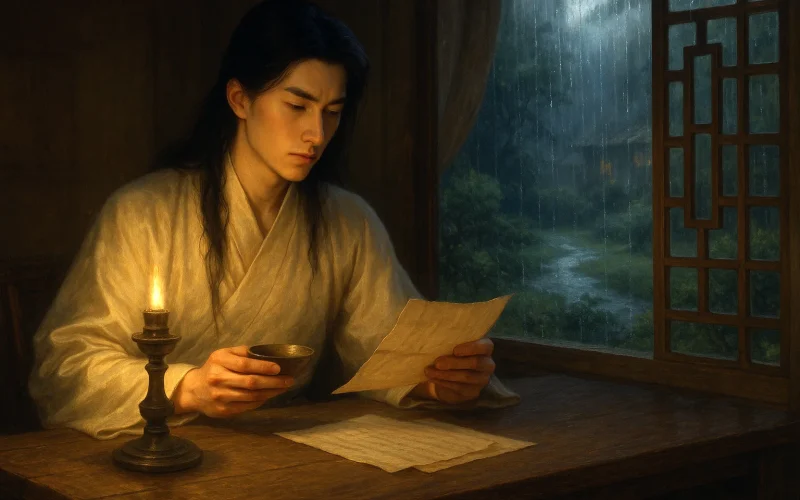No water's wide enough when you have crossed the sea;
No cloud is beautiful but that which crowns the peak.
I pass by flowers which fail to attract poor me
Hail for your sake and half for Taoism I seek.
Original Poem
「离思五首 · 其四」
元稹
曾经沧海难为水,除却巫山不是云。
取次花丛懒回顾,半缘修道半缘君。
Interpretation
This work was composed by Yuan Zhen in 809 CE during the Yuanhe era to mourn his wife Wei Cong, who passed away at twenty-seven. Among his many elegies, this stands as the most renowned. Through poignant recollections and profound emotional expression, the poem reveals his unending grief. Even spiritual pursuits couldn't alleviate his longing, laying bare a love that transcended life and death.
First Couplet: « 曾经沧海难为水,除却巫山不是云。 »
Céngjīng cānghǎi nán wéi shuǐ, chú què Wūshān bú shì yún.
Having seen the ocean, no water deserves the name; Beyond Witch Mountain's peak, no clouds hold true fame.
These lines employ classical allusions: "the ocean" (沧海) symbolizes their boundless love, while "Witch Mountain" (巫山) represents love's pinnacle. Together, they declare Wei Cong's irreplaceability—a devotion so absolute it redefines beauty itself.
Second Couplet: « 取次花丛懒回顾,半缘修道半缘君。 »
Qǔ cì huā cóng lǎn huígù, bàn yuán xiūdào bàn yuán jūn.
Through blooms I wander, never glancing back; Half for enlightenment, half for what I lack—you.
Here, floral beauty pales against his fixation. "Half for enlightenment" (半缘修道) thinly veils his true motive: a heart too broken to love again. The couplet's resigned tone betrays spiritual pretense—his retreat from the world stems from inability to replace her, not transcend desire.
Holistic Appreciation
In just four lines, Yuan Zhen forges an emotional monument. By framing Wei Cong through mythic lenses ("ocean," "Witch Mountain"), he elevates their bond beyond mortality. This isn't mere nostalgia but a recalibration of reality—where her absence voids all else's significance. The poem's power lies in its paradox: using cosmic imagery to express uniquely human devotion.
Artistic Merits
- Allusive Depth: "Ocean" and "Witch Mountain" distill love into archetypes, universal yet intimate.
- Precision of Grief: Phrases like "never glancing back" (懒回顾) convey volumes through restraint.
- Structural Symphony: The parallel couplets—first declarative, then confessional—create a crescendo from grandeur to raw vulnerability.
Insights
The poem defines love as singular and non-transferable: once the ocean drowns you, rivers seem shallow. In an age of disposable connections, Yuan Zhen's elegy reminds us that true love isn't additive but transformative—it alters one's emotional landscape permanently. His "half-hearted" monasticism lays bare a timeless truth: some losses hollow the soul beyond repair, making even transcendence a poor consolation.
Poem translator
Xu Yuanchong (许渊冲)
About the poet

Yuan Zhen (元稹), 779 - 831 A.D., was a native of Luoyang, Henan Province, who was poor in his early years, but later became an official and finally died of a violent illness. He was friendly with Bai Juyi and often sang with him, and was known as “Yuan Bai”.











